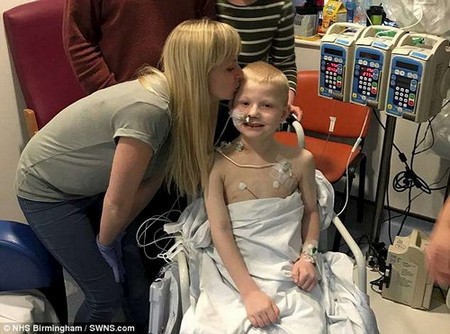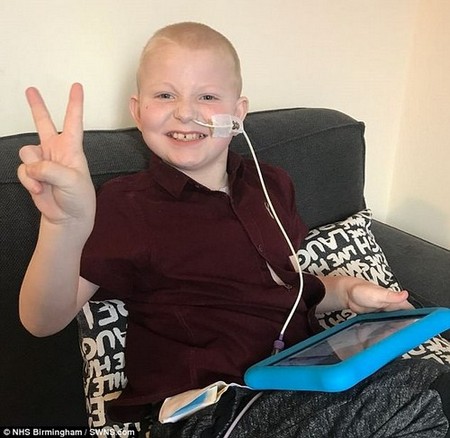The youngster, who suffers from anemia, small bowel syndrome and chronic renal failure, was forced to eat through a tube before the procedure finally allowed him to taste and swallow.
A seven-year-old boy is one of the youngest patients in Britain to undergo a multi-transplant operation to replace five organs. Jay Crouch received two new kidneys, a liver, a small intestine and a pancreas from a single donor in a mammoth 10-hour operation.
Following a four week stay, Jay was discharged from Birmingham Children’s Hospital, where he was the first child in 20 years to undergo the complex procedure, last Monday and is recovering at home.
Jay’s mother Katie Freestone, 28, from Market Harborough, Leicestershire, said: ‘It’s quite incredible really because we didn’t expect it to all go so well. He’s a little superhuman’.

Jay Crouch (pictured with his mother Katie Freestone, 28) is one of the youngest patients in Britain to undergo a multi-transplant operation to replace five organs from a single donor

After a grueling four weeks in hospital, Jay has been allowed home to recover with his family
WHAT IS SMALL BOWEL SYNDROME?
Small bowel syndrome is a group of problems relating to poor nutrient absorption. It typically occurs in people who have at least half of their small intestine removed, small intestine damage or poor movement in their intestines.
Sufferers cannot absorb sufficient water, vitamins or calories from their food. Some people are born with an abnormally short intestine or with part of their bowel missing. Small bowel syndrome can also occur if people develop a flesh-eating bacterial infection and need to have part of their intestines removed.
The main symptom is diarrhoea. Sufferers may also experience bloating, cramping, vomiting and fatigue. Short bowel syndrome can lead to malnutrition, kidney stones and ulcers on the lining of the stomach.
Treatment focuses on ensuring patients have adequate nutrition, as well as medication and surgery to increase vitamin absorption.
‘You can say thank you but that really doesn’t cover it’
When Jay was just six weeks old his small intestine became twisted, causing extensive damage to his major organs.
Speaking of her son’s surgery, Ms Freestone said: ‘It’s quite incredible really because we didn’t expect it to all go so well.
‘We knew how amazing he is and we thought he would do well but initially we were told he would be in for a much longer period, a few months, but it’s actually only been just over four weeks, so everybody’s pretty amazed at how he’s done.
‘I knew he would do great, he’s a little superhuman, I knew he would do well.’
Jay’s donor was a similar age to him. The donor’s various organs were being removed while others were transplanted into Jay.
Ms Freestone said: ‘My first thought when I got the phone call to say the organs were available, it was initially of sadness for the family who have lost someone at this time.
‘You can’t really express your gratitude enough towards them, there aren’t any words you can say.
‘You can say thank you but that really doesn’t cover it.
‘Without the organs Jay wouldn’t have survived so it’s that important.
‘There’s nothing I could say to express my gratitude.’
Transplant surgeon Khalid Sharif (pictured) carried out the multi-implant procedure at the same time as the donor’s organs were being removed. The donor was a similar age to Jay
Celebrated with a slice of toast
Jay celebrated being able to eat food for the first time with a slice of buttered toast.
He said: ‘I had some anaesthetic at first, when we first arrived, to get the whole stuff (tubes) into my body.’
Surgeons removed Jay’s liver, while the kidneys, pancreas, liver and intestine were being removed from the donor.
The new set of organs were attached to Jay’s aorta, which is the body’s largest artery, in his stomach. This gave Jay a bloody supply, while blood went back to his heart via the vein coming out of his liver.
The donor’s small intestine was then attached to Jay’s bowel. The youngster now has four kidneys and two pancreases.
Transplant surgeon Khalid Sharif said: ‘There are two connections from the vessels points of view, which is one artery giving the blood to all five organs and one vein taking the blood out of it.
‘There are two points to join the intestine and two points to join the juice from the new kidneys to the bladder.
‘If you have to join all these tasks separately there will be two joins per each organ separately, which makes a lot of joins.
‘You need to see all the organs linking up together.
‘If one is not doing it, that’s really heartbreaking, because you do not know what is going on.’



